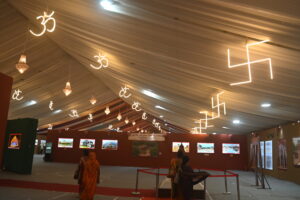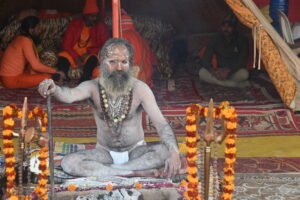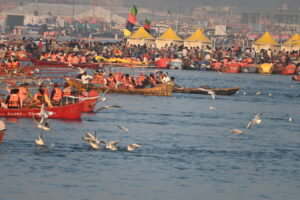
Photo copyright © Satyabrata Maiti
The Maha Kumbh Mela 2025 is one of the largest religious congregations in the world, which is in progress in Prayagraj, Uttar Pradesh from January 14 to February 26, 2025. During this event, millions of pilgrims gather to perform ritual baths at the Triveni Sangam, the confluence of the Ganga, Yamuna, and mythical Saraswati rivers. It is believed that this act would wash away their sins and make them spiritually purified.
Kumbha Mela is just more than a festival- is a confluence of faith, culture and human devotion to Almighty God of the Hindu faith irrespective of cast, creed, languages. The festival goes beyond religious practices and includes a rich blend of astrological, socio-cultural traditions and spiritual enlightenment.
The event also features spiritual discourses, yoga sessions, devotional music performances, and a vibrant display of India’s rich cultural heritage.
According to the beliefs, the nectar (Amrit) from the pot which ascended from the Samudra manthan (churning of cosmic ocean), caused a war between the Gods and Demons to own the nectar. To shield the pot from the demons, God Vishnu transformed into Mohini and took the pot up to heaven. While carrying the pot, drops of Amrit spilled onto the earth at four locations: Prayagraj, Haridwar, Nashik, and Ujjain. At these four places, Kumbh Mela takes place.
It is celebrated after every 12 years and called “Purna Kumbha Mela”, to celebrate each revolution of Jupitar (Brihaspati) at the four river-bank pilgrimage sites. The festival is marked by a ceremonial dip in the rivers, but it is also a celebration of community which commences with fairs, education, religious discourses by saints, mass feedings of monks or the poor, and entertainment. The seekers believe that bathing in these rivers is a means to prāyaśchitta (atonement, penance) for past mistakes, and it also cleanses them of their sins.
Places of Kumbha Mela
| Place | River | Zodiac | Months | First bathing date |
| Haridwar | Ganga | Jupiter in Aquarius, Sun in Aries | January–April | Maha Shivaratri |
| Prayagraj | Ganga, Yamuna,Swarastai junction | Jupiter in Aries, Sun and Moon in Capricorn; or Jupiter in Taurus, Sun in Capricorn | January–February | Makara Sankranti |
| Nashik | Godavari | Jupiter in Leo; or Jupiter, Sun and Moon enters in Cancer on lunar conjunction | August–September | Simha Sankranti |
| Ujjain | Shipra | Jupiter in Leo and Sun in Aries; or Jupiter, Sun, and Moon in Libra on Kartik Amavasya | April–May | Chaitra Purnima |
There is also a “Ardha Kumbha” celebrated after every six years in these places. However, Maha Kumbha is celebrated after every 144 (12×12) years. We, the people living now are extremely fortunate to celebrate Maha Kumbha in 2025. Even a child who is borne today may not have this opportunity in their lifetime.
Approximately 50 and 30 million people attended the Prayagraj “Ardh Kumbh Mela” in 2019 and “Purna Kumbh Mela” in 2013, respectively to bathe in the holy river Ganges, making them the largest peaceful gathering events in the world. It is expected that about 400 to 500 million people will be taking bath in “Maha Kumbha-2025” in this year.

The Amrit Snan (Holy bath) is among the most important rituals of the Maha Kumbh Mela.
Here are the important dates for Amrit Snan during Maha Kumbh Mela 2025:
1. Paush Purnima: January 13 -First Amrit Snan
2. Makar Sankranti: January 14- Second Amrit Snan
3. Mauni Amavasya: January 29, 2025- Third Amrit Snan
4. Basant Panchami: February 3, 2025- Fourth Amrit Snan
5. Maghi Purnima: February 12, 2025- Fifth Amrit Snan
6. Maha Shivratri: February 26, 2025- Sixth Amrit Snan
Origin of Kumbh Mela
The origin of the Kumbh Mela is deeply rooted in Hindu mythology and ancient history. According to legend, the first Kumbh Mela occurred after the churning of the cosmic ocean (Samudra Manthan) by the gods (Devas) and demons (Asuras) to obtain the nectar of immortality (Amrit). During this churning, a few drops of the nectar fell at four sacred locations: Prayagraj, Haridwar, Ujjain, and Nashik.
The present version of Kumbh Mela is credited to the 8th-century Hindu philosopher and saint Adi Shankara, who started major Hindu gatherings for philosophical discussions and debates along with Hindu monasteries across the Indian subcontinent. However, the festival’s origin is believed to be around 2000 years old, with the first written account found in the records of the Chinese traveller Xuanzang during the rule of King Harshavardhana.
Forth coming Kumbha Melas
| Place | Year | Type of Kumbha |
| Haridwar | 2027 | Ardh Kumbh Mela |
| Nasik | 2027 | Purna Kumbh Mela |
| Ujjain | 2028 | Purna Kumbh Mela |
I was eagerly waiting for this occasion after visiting Maha Kumbh in Haridwar (2021) during Covid period despite all opposition from my teachers, friends and well-wishers. Therefore, I booked my railway tickets in 120 days’ advance. I also booked my hotel through travel app with little difficulties. I had to take two hotels for my three-night stay.
Day-1
On 21-Jan-2025 boarded the train from Anand and got dropped in Prayagraj Chhauni station on 22-Jan-2025 which was about 12 km away from my hotel. There was difficulty in reaching the hotel since many roads were closed and diverted to regulate the crowd. I reached the hotel by 10:30 am and left the hotel keeping luggage with a young college boy (Ankit) who accompanied me to guide in the mela by the Indian Council of Forest Research and Education (ICFRE) station located in Prayagraj. We reached the Mela location by 11:00 am and started exploring various exhibitions organised by the spiritual leaders, temple authorities, NGOs and UP state (photographs in the photo gallery). It was mainly for showcasing their activities and social work done for the society. We visited a few but could not dare to cover all. It was so vast and beyond my imagination. In the evening, we returned back to hotel.
Day-2
I started my day-2 at 8:30 am with a professional guide named Prashant, who is also a final year B.A student. We started our visit to various Akharas (living place of Saints). There were two Akharas where permission was not granted. We covered about ten Akharas and I took lots of photographs of the Naga and other sects of Sadhus. From there we went to Kila ghat to catch a boat for going to Sangam for taking a dip in the confluence. But it was so crowded and after some time service was suspended since there was boat mishap without any casualties. We then decided to visit Akshya Vat (big Banyan tree), Saraswati Kund, Patalpuri inside the fort which is under the control of the military. A Zigzag line was formed for the entry. It took about 1:30 hours in the line to reach the entry gate. After the visit of all these places, we thought of visiting the Hanumanji temple nearby, but abandoned the idea once we looked at our watch. The temple would be closed for two hours during 2:00-4:00 pm. We then decided to have some snacks and tea and thereafter Prashant contacted a boat owner in Arail Ghat by the Yamuna river, who agreed to take us to the Sangam Ghat for taking a dip. It was about 12 km away and we could cover the distance mostly by walking except a small path by a shared auto. We crossed a rail bridge also on the way. The bridge itself was about 1.5 km. Finally when we reached the ghat, Rajat, a young boy came to receive us and took us to his boat which was run by him with his uncle. Rajat was a nice, knowledgeable, sober and friendly boy who took me in his boat like his own grandfather. We reached Sangam ghat and then he again took me to the bathing place where I enjoyed the bath for some time and then returned back in the boat. The boy took us for a ride in the Ganga and Yamuna River for about one hour and then dropped us at the Ghat. By that time, we were fully exhausted and when I checked the Google fit App, I found that we had walked about 25 km. We were so exhausted that we had to return to our hotel from the Ghat by the scooter left at the Ghat that was brought to us by Prashant’s brother.
Day-3
Since I had to vacate the hotel and go to a new hotel for that night’s stay, I got up early and went out on foot to visit a Shakti Peeth temple about 2 km away from my hotel (I shall write about it in an another blog to keep this blog focused). I returned from the temple and got ready to check-out the hotel and went to a new one which was about 8 km from this hotel. I reached there by 11:30 am and checked-in. Ankit came at about 12:30 pm and he was enthusiastic to show me some places in the city. After visiting two parks we again went back to Kumbha Mela site and visited some stalls. Finally we went to (ICFRE) stall and met their scientists, including Dr. Sanjay Singh, Dr. Alok Yadav and others who helped me by referring me for the service of Ankit. After visiting their stall Ankit dropped me in the hotel which was near to Prayagraj Junction Railway station from where I was to board the train next morning at 5:00 am.

Day-4
I boarded the train at 5:30 am and started recapitulating my last three days’ activities. Feeling contended about the wonderful Maha Kumbha experience and the time I spent in Prayagraj with Ankit, Prashant and Rajat. It was reminding me of a poem of Kabi Guru Rabindranath Tagore:
“কত অজানারে জানাইলে তুমি, কত ঘরে দিলে ঠাঁই–
দূরকে করিলে নিকট, বন্ধু, পরকে করিলে ভাই॥
পুরানো আবাস ছেড়ে যাই যবে, মনে ভেবে মরি কী জানি কী হবে,
নূতনের মাঝে তুমি পুরাতন সে কথা যে ভুলে যাই॥”
(Translation: You made unknown to be known, gave shelter in numerous houses;You made unknown to be a friend and unrelated to be a brother. When I leave my old abode, I wonder what will happen, I forget that you are an old within the new.)
Day-5
I reached Anand at 2:30 in the early hours and went to bed with a heart-full of gratitude to the Almighty for showering me with this opportunity and to witness a vast diversity of people visiting Kumbha with unbelievable Sanatani faith on nature, creation, empathy, compassion and sense of service to the devotees.
Jai Hind!
Satyabrata Maiti
Acknowledgement
- This blog would remain incomplete if I don’t thank the Honourable Chief Minister of U. P. and his dedicated bunch of administrative personnel including service force to raise the level of Maha Kumbh in such a height.
- A. K. Pandey, IFS and formerly Joint Director ICFRE, Dehradun for extending his helping hand in connecting me with ICFRE office of Prayagraj.
- Sanjay Singh and Dr. Alok Yadav of ICFRE office of Prayagraj for providing Ankit’s service.
- Ankit Shyam Narayan and Mr. Prashant Pandey for giving their valuable time with me in the Maha Kumbha Mela
- Rajat for the river ride and holy dip in Sangam
References:
- Wikipedia
- Online resources
- https://satyabratamaitiblog.co.in/my-journey-to-haridwar-kumbha-mela-2021/
Photo gallery
Facilities created





Mela site



















Functions and showcasing of cultures





Sadhus of various Sanatani faith























Sangam












Business in Mela





Devotees









My Guides





I have gone through your experience in Maha Kumbh and I feel good that you were in position to take a dip in the confluence of 3 rivers inspite of great difficulties faced by the people to reach the site of river dip.It is the faith that the taking a dip in the river is Holy as per Hindu Mythology and the satisfaction out the dip is enormous.
Thank you Mrinmoy for your comments and observation. Everything is in mind. That’s why poet says this world is “Monomoy”.
What a wonderful experience !! Thanks for sharing the vivid description of Kumbhamela and the fantastic photographs. Nice blog. Jai Sanatan Dharma.
Thank you Munnu for your encouraging feedback.
Very interesting subject , thankyou for putting up.